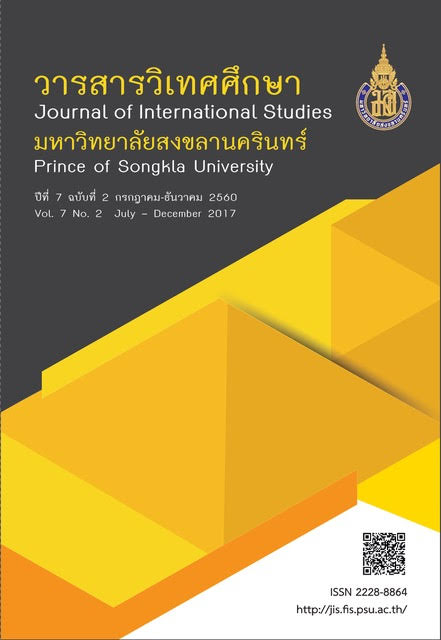Testing an Expected Utility Theory of War: Mao’s Decision for War in Korea as a Case Study
Main Article Content
Abstract
In this article, the expected utility theory of war is tested against a case study of Mao’s decision for war in Korea. The data used in the test is generated from the EUGene software, designed specifically to test this theory. In this case study, the empirical evidence does not support the hypothesis derived from the theory. However, the results of this test need to be placed in a wider context.
Article Details
Statements and opinions expressed in articles herein are those of the authors and do not necessarily reflect the position of the editors or publisher.
Article, information, text, image, etc. which are published in Journal of International Studies, belong to Journal of International Studies. If anybody or any organization would like to use part or whole of them, they must receive written permission from Journal of International Studies before usage.
References
Bennett, D. S., & Stam, A. C. (2000). Eugene: A conceptual manual. International Interactions, 26(2), 179-204. doi: 10.1080/03050620008434965
Briggs, R. (2015). Normative theories of rational choice: expected utility. In E. N. Zalta (Ed.), The Stanford Encyclopedia of Philosophy (Winter 2015 ed.).
Bueno de Mesquita, B. (1980). An expected utility theory of international conflict. The American Political Science
Review, 74(4), 917-931. doi: 10.2307/1954313
Bueno de Mesquita, B. (1981). The war trap. New Haven, CT: Yale University Press.
Bueno de Mesquita, B. (1985). The war trap revisited: A revised expected utility model. The American Political Science Review, 79(1), 156-177. doi: 10.2307/1956125
Bueno de Mesquita, B. (1989). The contribution of expected-utility theory to the study of international conflict. In M. I. Midlarsky (Ed.), Handbook of war studies, volume 1 (pp.143-169). Boston, MA: Unwin Hyman.
Bunyavejchewin, P. (2015). Revisiting Thailand’s aggression against Cambodia, 1953–1962: An expected utility theory of warinitiation. Pertanika Journal of Social Sciences & Humanities, 23(2), 413-429.
D'Anieri, P. (2010). International politics: Power and purpose in global affairs. Belmont, CA: Wadsworth.
Feng, H. (2007). Chinese strategic culture and foreign policy decision-making: Confucianism, leadership and war.
Abingdon: Routledge.
Gaddis, J. L. (2007). The Cold War. London: Penguin Books.
Garver, J. W. (1993). Foreign relations of the People's Republic of China. Englewood Cliffs, NJ: Prentice-Hall.
Geller, D. S., & Singer, J. D. (1998). Nations at war: A scientific study of international conflict. Cambridge: Cambridge University Press.
Goncharov, S. N., Lewis, J. W., & Xue, L. (1993). Uncertain partners: Stalin, Mao, and the Korean War. Stanford, CA: Stanford University Press.
Hu, W. (2005). Mao's American strategy and the Korean War/. (Doctor of Philosophy), University of Massachusetts Amherst.
Hunt, M. H. (1992). Beijing and the Korean crisis, June 1950- June 1951. Political Science Quarterly, 107(3), 453-478. doi: 10.2307/2152440
Jian, C. (1995/1996). China's road to the Korean War. Cold War International History Project Bulletin(6-7), 41, 85.
Jian, C. (2001). Mao's China and the Cold War. Chapel Hill, NC: University of North Carolina Press.
Kim, W. (1991). An expected utility model of regional rivalry: A case of North and South Korea. Asian Perspective,
(2), 125-148.
Langlois, M.J. (2012). Understanding Russian aggression towards Georgia: An expected-utility approach. Politikon, 18(1), 34-46.
Majeski, S.J., & Sylvan, D.J. (1984). Simple choices and complex calculations: A critique of the war trap. The Journal of Conflict Resolution, 28(2), 316-340.
Mantzavinos, C. (2004). Individuals, institutions, and markets. Cambridge: Cambridge University Press.
Pye, L. W. (1996). Rethinking the man in the leader. The China Journal(35), 107-112. doi: 10.2307/2950278
Quackenbush, S. L. (2015). International conflict: Logic and evidence. Thousand Oaks, CA: CQ Press.
Retief, F., & Wessels, A. (2009). Mao Tse-tung (1893 - 1976): His habits and his health. SAMJ: South African Medical Journal, 99, 302-305.
Sheng, M. M. (2001). Mao Zedong’s narcissistic personality disorder and china’s road to disaster. In O. F. a. L. O. Valenty (Ed.), Profiling political leaders: Cross-cultural studies of personality and behavior (pp. 111-127). Westport, CT: Praeger.
Shimko, K. L. (2016). International relations: Perspectives, controversies & readings (5th ed.). Boston, MA:Wadsworth.
Sprout, H., & Sprout, M. (1965). The ecological perspective on human affairs: With special reference to international politics. Princeton, NJ: Princeton University Press.
Sullivan, L. R. (2012). Leadership and authority in China, 1895-1976. Plymouth: Lexington Books.
Wagner, R.H. (1984). War and expected-utility theory. [The War Trap., Bruce Bueno de Mesquita]. World Politics, 36(3), 407-423. doi: 10.2307/2010381
Whiting, A. S. (1960). China crosses the Yalu: The decision to enter the Korean War. New York, NY: Macmillan.
Yufan, H., & Zhihai, Z. (1990). China's decision to enter the Korean War: History revisited. The China Quarterly(121), 94-115.
Zagare, F.C. (1990). Rationality and deterrence. World Politics, 42(2), 238-260. doi:10.2307/2010465
Zhang, S. G. (1995). Mao's military romanticism: China and the Korean War, 1950-1953. Lawrence, KS: University Press of Kansas.


